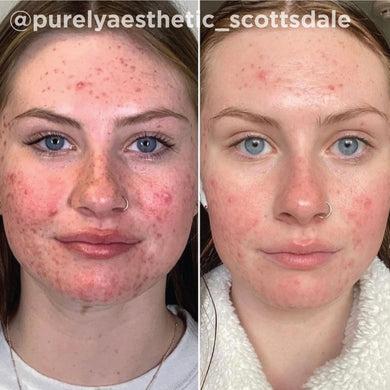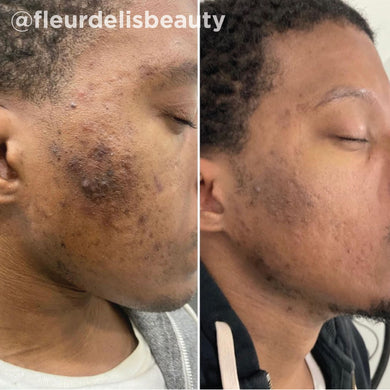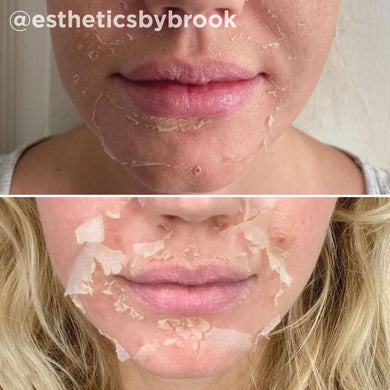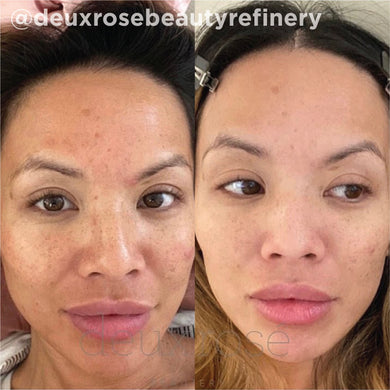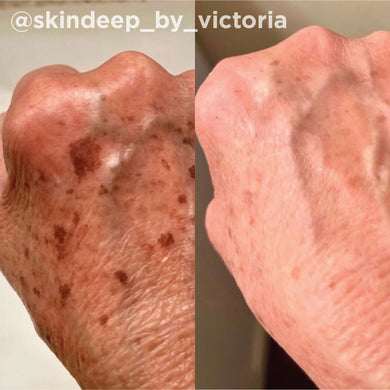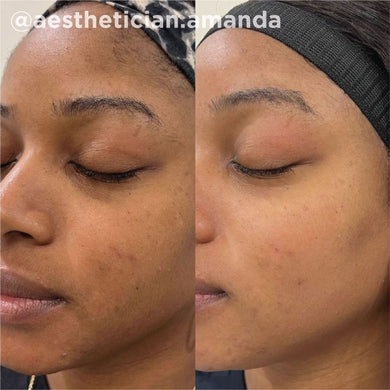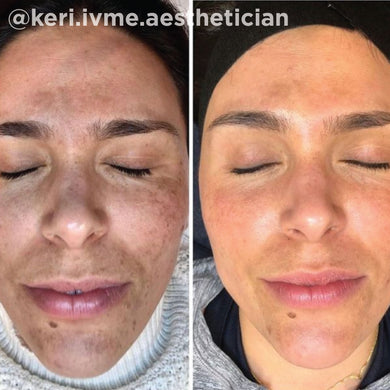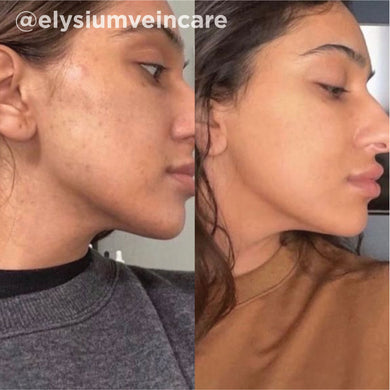Why people of color may not be getting the daily sun protection they need. Let’s change that.
Written by Sumayah Jamal, MD, FAAD as part of The Brown Skin Agenda Initiative.
Caring for skin of color has been a passion of mine for decades—and I’ve come to a conclusion: I spend as much time dispelling myths around dermatology and skin of color as I do performing procedures. Especially the myth that “Black and brown skin doesn’t need SPF.” This myth about sunscreen for skin of color has morphed into a stereotype and the psychological belief that gives permission to melanin-rich skin tones to pass on sun safety practices.
And it’s coming at a huge cost. Enter the statistics, or what I like to call “Fact vs Caveat.”
Fact vs. caveat
- FACT: Skin cancer risk is in fact, lower in skin of color due to a higher melanin concentration that naturally filters/blocks UV light
- CAVEAT: However, the key word here is “risk”: Studies aren’t saying that people of color won’t ever get skin cancer, just that the possibility is lower—and the words “possibility” and “lower” don’t equate to “never” or “zero”
- CAVEAT: Death caused by skin cancer is higher in people of color because it’s often diagnosed late, when in an advanced stage and/or symptoms are not easily recognized. There’s also a lack of access to care (according to the Asian Pacific Journal of Cancer Prevention)
- FACT: People with melanin-rich skin are less likely to sunburn when compared to white-skinned people (According to the International Journal of Dermatology) and one study estimates that the epidermis of Black skin has a “natural” SPF of 13.4, and lighter skin has an SPF of 3.3
- CAVEAT: Again, tap into the key words “less likely”: less likely does not equal zero, as melanin does not completely protect against UV damage. You still need SPF protection to fight against the different types of sun damage that occurs in your skin
- CAVEAT: Redness is the prevalent visible indicator of sunburn that may not show in darker skin. Sunburn symptoms like dryness and itching are sunburn indicators that might be missed, leading many people with darker skin to believe they’ve never had a sunburn, and therefore don’t need sunscreen
Like so many things, it’s the stories we tell ourselves that we believe the most, and the stories about sunscreen for skin of color are clearly countered by science.
What can black skin and brown skin do to shield against UV damage?
First, undo the stereotypes and accept the science that ALL skin types and tones need protection against the sun’s harmful rays. Second, recognize that clinical trials and medical journals are just now starting to diversify their participants for a more accurate representation of skin of color, UV damage, skin cancer, and skin protection via sunscreen for skin of color, meaning the statistics we have today will see a dramatic—and more accurate—shift. That’s why seeing a dermatologist for regular skincare screenings is so important. They’ll have the most up-to-date information on how to help darker skin tones prevent and detect skin cancer in the earlier stages when it is most treatable and curable. They can also recommend SPF for dark skin or an SPF for black skin—even a specific sunscreen for the face—that won’t leave you looking ashy.
Take note: This isn’t your mother’s sunscreen
The days of chalky, sticky, un-spreadable SPF that turned your beautiful Black skin ashy or purple are no more. Enter sunscreen for skin of color, developed by reputable skincare companies and BIPOC-owned brands that know SPF for black skin and SPF for dark skin is essential to staying healthy from head to toe. New sunscreens for skin of color are invisible and melt into skin with the ease of a moisturizer—weightless and undetectable under makeup—with beneficial ingredients that make your skin feel better and act healthier.
If you’re prone to breakouts or believe sunscreens trigger skin issues like sensitivity, it’s never been easier to seek out non-comedogenic (non-pore clogging), hydrating, and anti-irritating sunscreens that truly better your skin type and skin condition while providing protection. Try VI Derm SPF 50 Daily UV Defense Broad Spectrum Sunscreen for a lightweight SPF that nourishes and hydrates while it protects.
What’s the importance of broad-spectrum SPF for black and brown skin (and all skin tones)?
Whether it’s SPF for face or for body, always look for words like “broad-spectrum protection” or “blocks UVA and UVB light” when choosing your SPF skin defense. What does broad-spectrum mean? It means a sunscreen defends against the UVA and UVB wavelengths of light. UVA rays are known to penetrate deeper into the skin and (in addition to causing premature skin damage like dark spots, sagging, and wrinkles) are primarily credited for causing skin cancer. UVB rays are responsible for sunburn and can also cause skin cancer. Protecting against both is critical for all skin types and tones, from the fairest to the most melanin-rich.
Do I need to worry about blue light?
In a word, yes. High exposure to blue light is known to cause skin discoloration in darker skin tones. Here’s a fact about blue light: not only is it emitted by our electronic devices, but it’s also emitted by the sun. That means it’s always been around and it’s quite literally everywhere! Only recently has our constant (and chronic) exposure to digital screens and fluorescent bulbs brought to light the potential for damage to our skin. There are many emerging studies on the effects of blue light from our digital devices, and although this is a new area of study, there is no reason to discount the importance of protection. When looking for an SPF that protects your skin against blue light, opt for one that includes iron oxides or a non-nano zinc oxide. In addition, many formulators are now adding antioxidants to zinc oxide-formulated sunscreens to reflect and stave off blue light damage.
Do you REALLY have to reapply SPF?
In an ideal world, yes, you’d reapply sunscreen every 2 hours for optimal UV defense regardless of your setting—indoors or outdoors. However, this might be a bit tricky if you’re wearing a face moisturizer with SPF underneath makeup, or just can’t schedule a reapplication session in the middle of your busy workday. While a spray or powder SPF would work well for those wearing makeup, I tell my patients to simply reapply whenever they can. There’s just one exception to this rule: if you’re going to be outdoors and engaging in sun activities, sweating, swimming, and the like, it’s crucial to reapply every 2 hours to protect your skin from sun damage.
Just one more thing: SPF is not seasonal
Across the skin color spectrum of my patients is this shared (and 100% inaccurate) belief: Sunscreen is seasonal and only needed when we’re exposing more skin or spending more time outdoors (think spring and summer months).
The reality: UV light is what causes sunburn and sun damage. UV light surrounds us anytime the sun is up. UV light can permeate clouds and penetrate windows. The incident of sunburn may be lower during the winter, but daily UV exposure is cumulative, meaning it adds up over time and surfaces as cosmetic concerns—dark spots and premature wrinkles and sagging—to more serious concerns like melanoma and skin cancer.
Simply put, adding SPF/sunscreen in your daily routine no-matter-what could be the best way to make yourself more aware of your potential for sun damage throughout the day, any time of the year, for both fair and dark skin, and everything in between.
About Dr. Sumayah Jamal
Sumayah Jamal, MD-PhD is a Clinical Assistant Professor of Dermatology at Mt. Sinai School of Medicine, specializing in the skin of color. She conducted her undergraduate studies at Johns Hopkins and completed her MD-PhD at NYU School of Medicine. In addition, she conducted her Internship in General Medicine at Columbia Presbyterian and her Dermatology Residency at NYU School of Medicine.
Dr. Jamal was Founding Director of the Ethnic Skin clinic at NYU School of Medicine for 13 years until she joined the Schweiger Dermatology Group, where she currently serves as Program Director for the Skin of Color Speciality Clinic.
Sources:
Preventative Medicine Reports, 2019
International Journal of Dermatology, Sunburn and sun protection in Black skin

